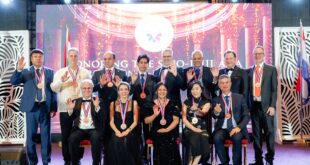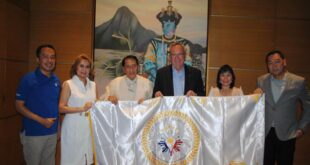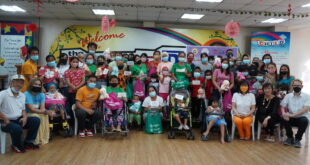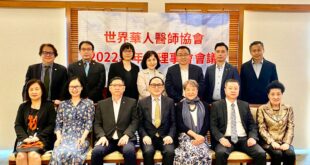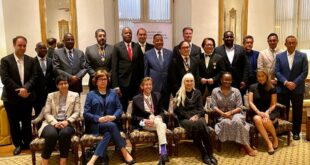Aussie Rules at Sino Asia-Pacific Forum
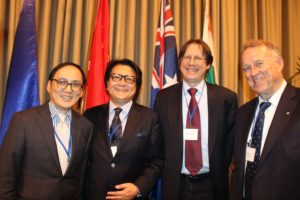
Text: By Christopher Cottrell / Photo Credit: Christopher Cottrell
The Sino Asia-Pacific Medical Forum in Manila last week witnessed wise words—three of those voices stemmed from Perth, Australia.
High among them was Dr. Kingsley Faulkner, former president of the Royal Australasian College of Surgeons.
The medical forum drew together sharp medical minds from around the world—from Michael Nobel of the Nobel family and his medical charity work, to Prof. Manson Fok, a Hong Kong and Macau based thoracic surgeon and philanthropist. Dr. Faulkner is also known for his strong stances on combating climate change, and stopping sexual harassment in operating rooms and hospitals to save lives.
On the sidelines of the Sino Asia-Pacific medical forum in Manila, Dr. Faulkner said, “It’s vastly important that Australia is part of this region. We must be engaged with Southeast Asia and with the whole Pacific. It is in our interest. It is in the region’s interest. Medicine is a marvelous conduit for an exchange of ideas between people, breaking down barriers and building bridges. It’s been fantastic meeting people from Syria [at the forum] and other parts of the world where there are troubles, and hearing there perspective on the tragedy of what’s happening in the Middle East. To meet people that can see the tragedy that are intelligent and articulate and determined to see a better life for their people.”
Regarding the environment, Dr. Faulkner said, “Climate change has certainly created an impact in my own country. The average temperature of the capital cities of Australia are predicted to increase substantially. The rates of heat waves and bush fires in some regions and floods and cyclones in others are going to predictably get worse. Eventually we’ll be effected by storm surges on our coast lines. We are part of the Asia Pacific and the Pacific Islands people are suffering existentially. Some of those island nations like Kiribati are in real risks of disappearing. That for them is appalling.”
Dr. Faulkner elaborated on this latter point, noting, “One of the great challenges of this whole problem of climate change is that we will see environmental refugees. At the moment there is no international, United Nations convention on environmental refugees. The world is already suffering from the influx of refugees because of war and poverty and hunger, and drought. But we’re going to confront a new wave and Australia is going to have to accept those peoples if they are displaced. At the moment their struggling. There is already debate about people coming to our country in large numbers. This is a big issue.”
Dr. Faulkner further noted, “Australia has proven that over time, you’ve got evidence so strong linking tobacco and multiple diseases, lung cancer and many others, that you can gradually persuade the public that this must change. And you can get sufficient community support for governments to bring in legislation to make the change. Now Australia has done that, not without a struggle, but it’s done it. We’re seeing the consequences. Our smoking rates have dropped and continue to drop. Australia is leading the world in this area.”
He added a word of a caution, “But we’re dragging our feet, we’re lagging behind on addressing climate change. We’re backward and likely to loose the Great Barrier Reef because we’re not doing more. It is a tragedy environmentally and it is a great challenge to health in our communities and in communities across the world.”
Another Perth person putting in his words at the Sino Asia-Pacific was Dr. Ross Horley, CEO of Medical Synergy Australia. Dr. Horley said, “It’s important that countries like Australia give back to their local neighbors with medical expertise and training with diagnosis and so forth and so on. We’re all part of the one group here, and we’re all part of the one region, so for breaking down economic and cultural barriers, medicine is one way of doing it, imparting knowledge and imparting expertise.”
Regarding how Australia can compliment neighbors like China and India in the region, Dr. Horley said, “We’ve got a good bundle, and a good model of public health, and a lot of good research that is happening in Australia. There’s a lot of research that is unique in the world. Especially in areas like stem cell. In areas like simulation training, we are among the best in the Western world. In Asia, we need more. Simulation training is a really good way to quickly up-skill expertise. It’s a really good way to minimize error as in doctors operating on patients when their really not well prepared.”
Vice President and co-founder of the Sino Asia-Pacific Medical Forum, Dr. Billy Chan, also heralds from Perth. Now half based in his ancestral city of Macau, China and half in Perth, Dr. Chan commented on how the forum bridged medical peace and diplomacy. Dr. Chan, who is also the Vice President of the Gusi Peace Prize, said, “The Philippines has been a wonderful neighbor, and a great friend in Asia for centuries. Last year when we were here, the Philippines and China were at the lowest point in their relationship ever. Who could have imagined that after 12 months that things would turn around so beautifully.”
Dr. Chan continued, “Tonight we get together under one roof of health and peace. So never give up hope. We’ve heard this in our past forums with stories from the rescue mission of Dr. Susan Briggs at the twin towers [on September 11, 2001 in New York City] all the way to the Chinese military saving thousands of survivors of the Sichuan earthquake [of May 12, 2008]. We’re seeing these stories today too in our forums, with the collaboration we saw between Brazil and Hong Kong with Zika virus research, and all the way to what we have been in doing in Cambodia the last four months.”
Indeed, since launching in Macau and Manila last year with a special communiqué signed by former Portuguese president Eanes, the Sino Asia-Pacific Medical Forum has worked closely with countries like Cambodia—with the president of the Sino Asia-Pacific Forum, Prof. Manson Fok, donating HK$ 500,000 in sonographic equipment to enhance rural healthcare in Cambodia, among other efforts.
In the near future, Dr. Chan will be working with medical teams in China to train with doctors in Cambodia.
In other words, in the emerging scene of Sino Asia-Pacific medical collaboration, Perth’s being a good mate.
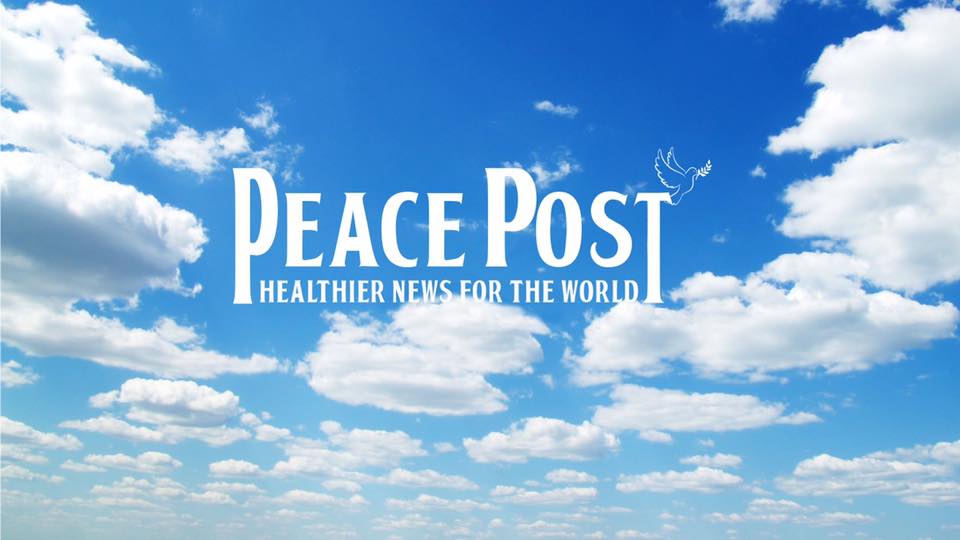 Peace Post Asia Healthier News For The World
Peace Post Asia Healthier News For The World
